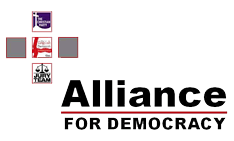This article has multiple issues. Please help improve it or discuss these issues on the talk page . (Learn how and when to remove these messages)
|
 | |
| Formation | 2010 |
|---|---|
| Type | Political organisation |
| Purpose | Electoral alliance |
| Headquarters | London |
| Location |
|
Region served | United Kingdom |
Official language | English |
Leader | Vacant [1] |
| Remarks | Ideology: English nationalism Christian right Conservatism Euroscepticism |
The Alliance for Democracy was an electoral coalition of two British political parties, the English Democrats and the Jury Team. The Christian Party, and Veritas were associates.
Contents
- Background
- Foundation
- 2010 general election
- Manifesto
- See also
- Constituent parties
- References
- External links
Its priorities were expanding the use of referendums, promoting non-career politicians, and cleaning up government and the processes surrounding the selection of the prime minister. [2] The Alliance was launched on 10 February 2010. [3]
